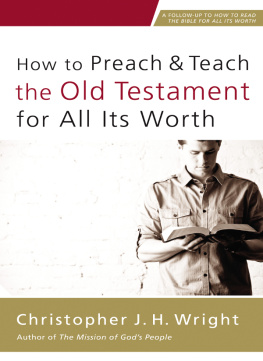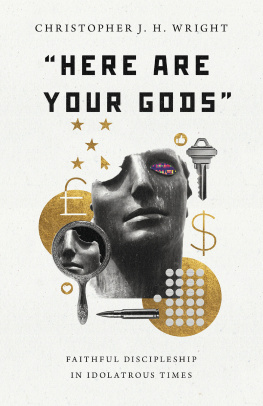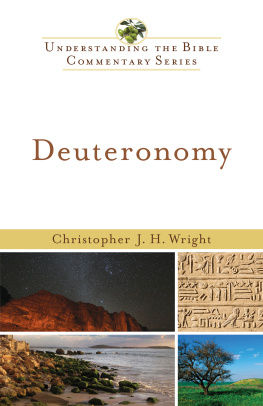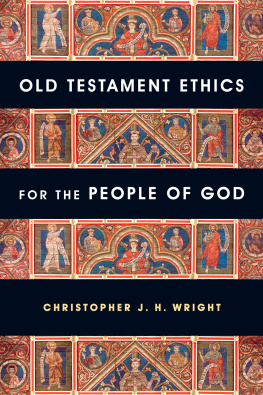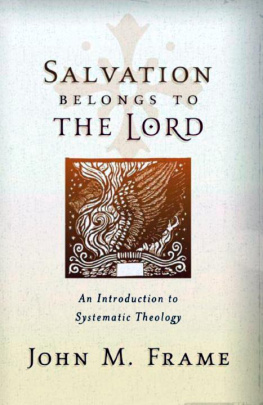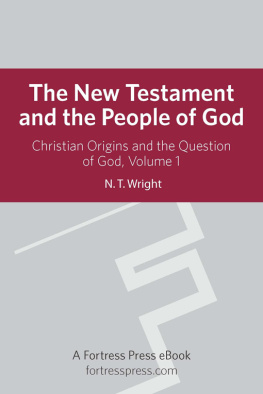Christopher J. H. Wright - Salvation Belongs to Our God
Here you can read online Christopher J. H. Wright - Salvation Belongs to Our God full text of the book (entire story) in english for free. Download pdf and epub, get meaning, cover and reviews about this ebook. year: 2012, publisher: Inter-Varsity Press, genre: Religion. Description of the work, (preface) as well as reviews are available. Best literature library LitArk.com created for fans of good reading and offers a wide selection of genres:
Romance novel
Science fiction
Adventure
Detective
Science
History
Home and family
Prose
Art
Politics
Computer
Non-fiction
Religion
Business
Children
Humor
Choose a favorite category and find really read worthwhile books. Enjoy immersion in the world of imagination, feel the emotions of the characters or learn something new for yourself, make an fascinating discovery.

- Book:Salvation Belongs to Our God
- Author:
- Publisher:Inter-Varsity Press
- Genre:
- Year:2012
- Rating:3 / 5
- Favourites:Add to favourites
- Your mark:
- 60
- 1
- 2
- 3
- 4
- 5
Salvation Belongs to Our God: summary, description and annotation
We offer to read an annotation, description, summary or preface (depends on what the author of the book "Salvation Belongs to Our God" wrote himself). If you haven't found the necessary information about the book — write in the comments, we will try to find it.
Christopher J. H. Wright: author's other books
Who wrote Salvation Belongs to Our God? Find out the surname, the name of the author of the book and a list of all author's works by series.
Salvation Belongs to Our God — read online for free the complete book (whole text) full work
Below is the text of the book, divided by pages. System saving the place of the last page read, allows you to conveniently read the book "Salvation Belongs to Our God" online for free, without having to search again every time where you left off. Put a bookmark, and you can go to the page where you finished reading at any time.
Font size:
Interval:
Bookmark:
InterVarsity Press
P.O. Box 1400
Downers Grove, IL 60515-1426
World Wide Web: www.ivpress.com
E-mail:
First edition 2008
2011 by Christopher J. H. Wright
All rights reserved. No part of this book may be reproduced in any form without written permission from InterVarsity Press.
InterVarsity Press is the book-publishing division of InterVarsity Christian Fellowship/USA, a movement of students and faculty active on campus at hundreds of universities, colleges and schools of nursing in the United States of America, and a member movement of the International Fellowship of Evangelical Students. For information about local and regional activities, write Public Relations Dept. InterVarsity Christian Fellowship/USA, 6400 Schroeder Rd., P.O. Box 7895, Madison, WI 53707-7895, or visit the IVCF website at www.intervarsity.org.
All Scripture quotations, unless otherwise indicated, are taken from the Holy Bible, New International Version. NIV. Copyright 1973, 1978, 1984 by International Bible Society. Used by permission of Zondervan Publishing House. All rights reserved.
Design: Cindy Kiple
Images: British Museum/Art Resource, NY
ISBN 978-0-8308-6634-2
It is a pleasure and a privilege to contribute a volume to a series which owes its origin to one of John Stotts fertile ideas. The Global Christian Library, or Christian Doctrine in Global Perspective, is a series intended to provide simple and readable surveys of key Christian doctrines, with the contributing authors coming mainly from the majority world, so that the series as a whole resonates with insights and perspectives from many different global contexts. At the time the series was conceived, John Stott had just invited me to take over the leadership of the Langham Partnership International, and since Langham Literature is the major sponsor of the series, he kindly invited me to contribute this study on Salvation. It is offered with thanks to John Stott and appreciation for the value of the other volumes in the series.
Two events contributed to the development of my thinking on the topic. The first was the conference of Anglican leaders and theologians from around the world in July 2002, hosted by Wycliffe Hall, Oxford, at which I was invited to present a plenary paper on Salvation. I chose to adopt a survey of biblical perspectives, starting from the very end of the Bible with the text, Salvation belongs to our God, who sits on the throne, and to the Lamb (Rev. 7:10), and using that as my template. Shortly after, I was invited to deliver The Frumentius Lectures 2005 at the Evangelical Theological College in Addis Ababa, Ethiopia (named after the first missionary bishop of Ethiopia in the fourth century). I developed the same approach further for those lectures. I am grateful to Peter Walker, Steve Bryan and Semeon Mulatu for their invitations and the stimulation they provided for the work which has eventually been consolidated in the following pages. And I thank David Smith (Series Editor) and Philip Duce (IVP), whose editorial work has helped improve and clarify my initial draft in many ways.
It will be clear that this book strives to treat its topic by gaining a biblical perspective that is as broad as possible. The Bible uses the vocabulary of salvation very widely indeed. I did not want to predetermine what constitutes acceptable theological categories, within a structured doctrinal framework. I rather wanted to take that text in Revelation 7:10 and find out what biblical assumptions, content, expectations and implications are nested within its simple phrases. I took the text for many a run and walk, chewing and turning it over again and again in the light of the rest of the Bible story and teaching. The results of meditating deeply on that text in all its biblical resonances were surprisingly comprehensive. I hope the following chapters will enrich readers grasp of how the Bible itself uses the language of salvation in such multifaceted ways.
Because I spend a lot of time in this book talking about the way the Old Testament speaks of salvation, it is necessary to be very particular about the God who meets us in the pages of the Old Testament. His personal name in Hebrew was YHWH, which in some older Bibles was roughly transliterated as Jehovah. Scholars nowadays tend to use the name Yahweh as a possible indication of how the original name was pronounced, though nobody can be completely sure. Ever since the Greek translators rendered the Hebrew letters with the title Kyrios , meaning the Lord, there has been a tradition of translation, which in English Bibles results in the use of the L ORD , in upper case. I sometimes use Yahweh, or the L ORD , where I want to make it very clear that the text is not just talking about God in some general sense, but specifically referring to the named covenant God of Old Testament Israel.
It is also very important to emphasize that when the word Israel is used in this book, we are talking about the biblical Israel of the Old Testament era, or its theological extension in the New Testament to include all those who through faith in the Messiah Jesus are included in the seed of Abraham. It is impossible to gain a fully biblical perspective on salvation without reference to the great story of Gods involvement with the people of Israel in biblical times, his promise to Abraham, the exodus, the covenant at Sinai, the temple and sacrificial system and, of course, the messianic promises that lead us to Jesus. But we shall see that the promise of God to and through biblical Israel was a promise that includes all the nations in its scope. Indeed, even in the Old Testament itself, Israel as the name for the covenant people of God becomes extended, in prophetic anticipation, to include other nations.
Most of all, it needs to be stressed very emphatically that although we do need to speak of Israel if we are to be faithful to the Bibles own story and teaching, there is nowhere in this book where I am referring to the modern Israeli state. That is not part of this discussion at all. In my view, great damage is done by those who confuse and conflate the Old Testament Israelites in the canon of the Bible, the contemporary diaspora of ethnic Jews around the world, Judaism as a religion, and the modern political state of Israel as if they were all the same thing, and can carry the same theological affirmations. I do not believe these four entities can or should be simplistically identified in that way. Especially we need to distinguish what we believe the New Testament says about the Jews as the ethnic descendants of Abraham from the claims and actions of the modern state of Israel, and not assume that the former can be simply applied to the latter. So I ask the reader constantly to remember that Israel in this book refers exclusively to biblical Israel, in the ways that the Bible itself uses the term in both the Old and New Testaments (ways which, in my opinion, bear no theological relation to the modern state of that name).
Salvation belongs to our God, but it is often received through human witnesses. In my own case, though I grew up in a Christian home as the youngest child of missionary parents and heard the gospel from infancy, it was my older brother Paul who once asked me, after Sunday school, whether my name was written in the Lambs Book of Life. I said I did not know (and probably did not even know what book he meant). He told me I needed to make sure it was. I asked him how, and he led me to open my heart to receive the Lord Jesus Christ as my Saviour. Having known the assurance of my own salvation ever since that moment in my early childhood, I am happy to dedicate this small book on the subject to him, with love and gratitude.
Font size:
Interval:
Bookmark:
Similar books «Salvation Belongs to Our God»
Look at similar books to Salvation Belongs to Our God. We have selected literature similar in name and meaning in the hope of providing readers with more options to find new, interesting, not yet read works.
Discussion, reviews of the book Salvation Belongs to Our God and just readers' own opinions. Leave your comments, write what you think about the work, its meaning or the main characters. Specify what exactly you liked and what you didn't like, and why you think so.

